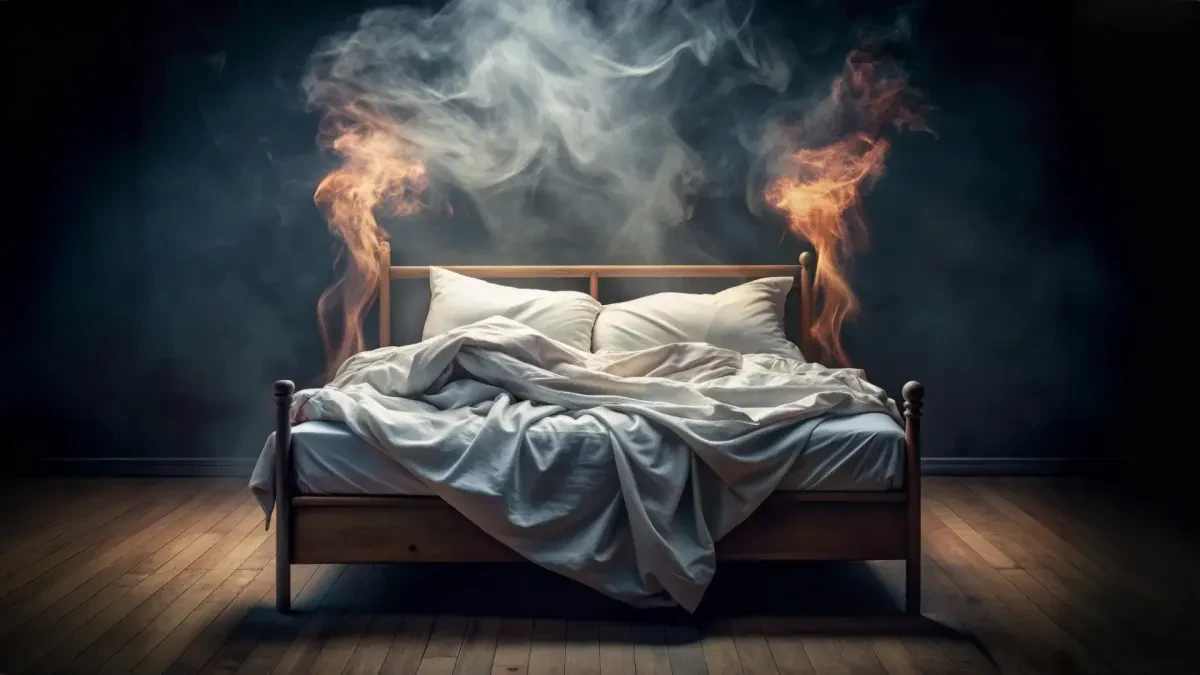Why Sleep Becomes a Battle in Midlife
If there is one thing my patients often tell me, it's this: "Doctor, I could deal with the hot flushes in the day if only I could sleep at night."
I've seen it countless times in my clinic. A woman in her forties or fifties, exhausted, frustrated, and sometimes in tears because she's had three nights in a row of broken sleep. One minute she's comfortable, the next she's drenched in sweat, sheets twisted, and wide awake at 2am.
Sleep disruption is one of the most common complaints in perimenopause and menopause. It's not just inconvenient. It chips away at mood, memory, and energy. Over the years, I've learnt that while there's no one-size-fits-all solution, there are natural approaches that make a real difference.
Let me share what works, the science behind it, and a few stories from women who've found their own path back to rest.
The Science of Night Sweats
Hot flushes and night sweats are caused by fluctuating oestrogen levels, which affect the part of the brain that regulates temperature. It's as if your thermostat gets confused. Instead of staying stable, it thinks you're overheating and kicks in a cooling response: blood vessels dilate, you sweat, and your body tries to shed heat.
That sudden rush of heat and sweat doesn't just wake you up. It triggers a cascade: higher heart rate, anxiety, and then difficulty falling back asleep. This is why many women also develop insomnia during perimenopause.
[product id= "79"]
Real Story: Jane and the Bed Sheet Olympics
Jane, one of my long-standing patients, used to joke that she deserved a medal for her "bed sheet gymnastics". Every night, she'd throw the duvet off during a sweat, then wake up shivering, pull it back on, and repeat the process until morning.
What changed things for her wasn't a miracle pill. It was a combination of breathable pyjamas, a cooling mattress topper, and herbal tea before bed. Within a few weeks, her "bed sheet Olympics" slowed down, and she finally managed a full six hours of unbroken sleep.
Practical Tips: How to Stop Night Sweats During Menopause Naturally
1. Optimise Your Sleep Environment
-
Cooling bedding: Look for moisture-wicking sheets, cooling gel pads, or a breathable mattress topper. Even small changes can reduce the intensity of sweats.
-
Temperature control: Keep the bedroom around 18°C. Use a fan or keep a window slightly open.
-
Layer wisely: Light layers of bedding work better than one heavy duvet.
2. Choose Breathable Nightwear
Avoid synthetic fabrics. Cotton or bamboo pyjamas wick away moisture and allow better airflow. A patient once told me switching pyjamas "felt like a small holiday for my skin".
3. Support Your Body Naturally
-
Herbal remedies, such as sage tea, valerian root, or chamomile, can help calm the nervous system.
-
Magnesium supplements: These may help with relaxation and muscle tension, and some women notice fewer night sweats.
-
Hydration: Drink water steadily through the day but cut back on caffeine and alcohol, both of which trigger sweats.
4. Wind Down Before Bed
A good routine matters. A warm (not hot) shower, a calming book, and avoiding screens help reset your body for rest. I once had a patient laugh that her best sleep hack was "ditching late-night Netflix crime dramas – because murder mysteries and menopause don't mix!"
5. Address Stress and Anxiety
Stress makes hot flushes worse. Mindfulness, yoga, or even simple deep breathing can reduce the frequency of night sweats. When your nervous system is calmer, your sleep is less likely to be interrupted.
Funny Fact: Menopause Meets Pets
One of my patients swears her Labrador is her "menopause partner in crime". Every time she woke in the night, drenched in sweat, the dog would sigh loudly and roll over as if to say, "Here we go again."
Eventually, she invested in cooling bedding and started using herbal teas. Both she and the dog started sleeping better. Proof, perhaps, that menopause affects the whole household, pets included.
Additional Remedies That Often Help
Weighted Blankets
At first glance, a heavy blanket might seem like a terrible idea if you're sweating. However, interestingly, some women find that a lightly weighted blanket (5–7kg) reduces nighttime anxiety and makes it easier to fall back asleep after a night of sweating.
Aromatherapy
Lavender oil has been studied for its calming effects. A few drops on a pillow or diffuser may ease stress and promote relaxation.
Exercise
Morning or early evening exercise helps regulate temperature, improves mood, and reduces insomnia. Avoid late-night high-intensity workouts, as they can exacerbate sweating.
[product id= "34"]
Maria's Three-Point Plan
Maria, 52, came to me after months of broken sleep. She was averaging four hours a night and felt like she was "walking through fog" all day. Together, we set up a three-point plan:
-
Sage supplements twice daily
-
Cooling gel pillow
-
A simple 10-minute mindfulness routine before bed
After six weeks, Maria wasn't cured – but she was averaging six to seven hours of sleep. More importantly, she felt hopeful again.
When to See a Doctor
While natural remedies help many women, there are times when professional advice is needed. If night sweats are extreme, persistent, or combined with other health concerns, speak to a healthcare professional. Hormone replacement therapy (HRT) or other medical options may be appropriate.
Helpful Products to Explore (Amazon Top Picks)
- Cooling gel mattress toppers
- Bamboo pyjamas
- Sage and magnesium supplements
- Herbal sleep teas
- Lavender oil diffusers
Small Steps, Big Changes
Menopause sleep problems can feel relentless, but there are natural ways forward. Cooling bedding, herbal remedies, mindful routines, and small lifestyle shifts can make a noticeable difference.
If there's one thing I've learnt from years of practice, it's that you don't have to tackle everything at once. Start with one or two changes, see how your body responds, and build from there.
And if all else fails, remember this: you're not alone, and even your dog might be rooting for you to get a better night's sleep.


